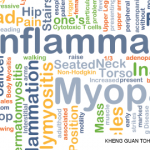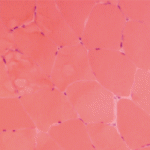Further research revealed the presence of autoantibodies to 3-hydroxy-3-methylglutaryl-coenzyme A reductase (HMGCR), the pharmacologic target of statins. Patients with this autoantibody were weak and had an elevated CK and appeared to represent a subgroup of necrotizing myopathy (NM). Moreover, the majority of patients had been exposed to statin prior to the onset of weakness. All of the patients responded to immunosuppressant therapy, and many relapsed when the immunosuppressant therapy was terminated. Taken together, the data suggested that the autoantibody to HMGCR was driving statin-associated NM.
Dr. Oddis then circled back to his patient and found that she was, indeed, positive for the anti-HMGCR autoantibody. Her weakness progressed over time, and at that point in the case history, she had a CK of 6367. Dr. Oddis increased her prednisone and added methotrexate. He then decreased prednisone and added Imuran/methotrexate. A month later, he added intravenous immunoglobulin (IVIG), and two months later, he saw that not only had her muscle weakness clearly improved, but she had her first normal CK reading. When her strength returned, he tapered her IVIG, but did not take her off of it completely. He discontinued Imuran and prednisone. He noted that she has been maintained on that regimen for five years, and although her CK levels have increased over time and remain elevated, her strength is acceptable and her health can be managed on methotrexate and IVIG.
Conclusion
Dr. Oddis concluded his presentation by calling on rheumatologists to recognize the clusters of symptoms that may reflect an autoantibody-associated systemic autoimmune rheumatic disease. These autoantibodies may accompany statin use, or they may be associated with lung disease. In particular, he drew the audience’s attention to the possibility of autoimmune interstitial lung disease contributing to systemic disease.
Lara C. Pullen, PhD, is a medical writer based in the Chicago area.


